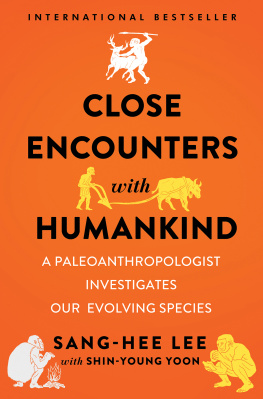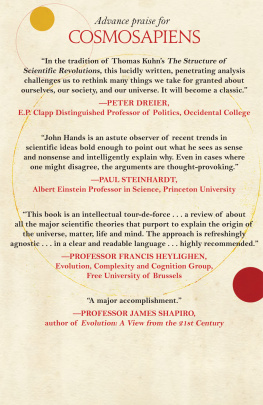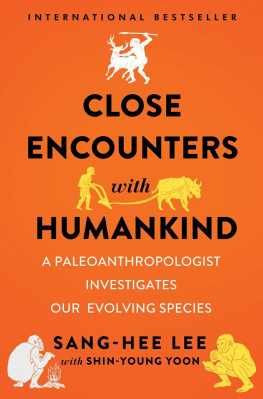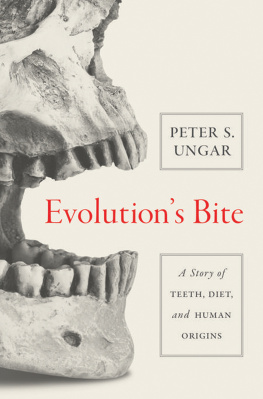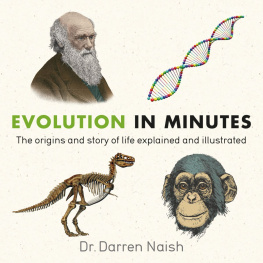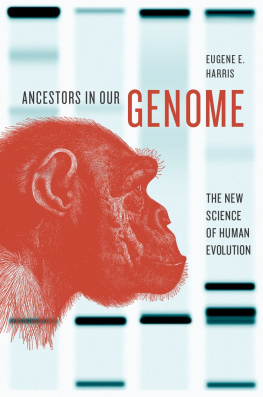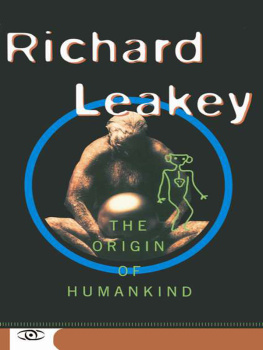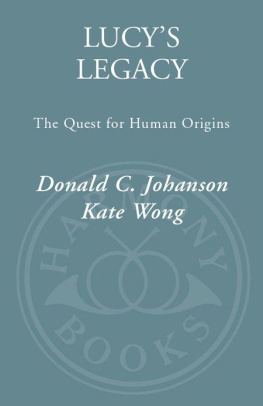
CLOSE
ENCOUNTERS
WITH
HUMANKIND
A Paleoanthropologist Investigates
Our Evolving Species
SANG-HEE LEE
with Shin-Young Yoon

Contents
CLOSE
ENCOUNTERS
WITH
HUMANKIND
I n 2001, I was about to start a new chapter in my life as an assistant professor in the Department of Anthropology at the University of California, Riverside. I was planning to ship everything I had to California, including my car, and then to travel elegantly on an airplane (all possible because UC Riverside was covering my moving costs).
That plan was soon thwarted. My adviser from graduate school strongly recommended that I drive across the country instead. Of course, I objected. Strenuously. I wanted to get to California as soon as possible, to get settled as soon as possible. But that was only a superficial reason; to be frank, the endeavor terrified me. After a long discussion, I gave in to my advisers convincing argument that this would be the only chance in my life to experience and feel intimately what America was about.
I was reminded of a book that had left a strong impression on me, Travels with Charley (1962) by John Steinbeck. I read it after I graduated from college, while preparing to start graduate school in the United States. Steinbeck took his dog Charley and drove across the country, agonizing over what it meant to be an American and what the nation was made of. He wrote frankly about the problems poisoning America, including racial inequality. From his depiction, it was not surprising at all that the civil rights movement broke out in the 1960s, shaking the whole country to its core. And this book made a deep impression on me as I was starting my life in the United States in 1990.
When I left Korea, there was little interest in multiculturalism and diversity among Koreans. To someone like me who had a vague and simple understanding about two races, black and white, the multidimensional aspects of race and the deep-rooted tension between races were quite foreign. So, when I took my advisers suggestion to drive across the country, I decided to make the most of the experience by talking with people everywhere I went, seeing and feeling everything. I packed a voice recorder, along with the rest of my belongings that were not shipped, into my 1994 Dodge Voyager minivan (a reliable car, but one with manual windows, no air-conditioning, and not even a tape deck) and set out.
I decided on a few guiding principles before I started the cross-country drive. First, I would stay away from freeways and use local roads as much as possible. I didnt have a portable phone back then, so I bought an emergency phone that could only call 911, and a charger that could charge on a car battery. I bought a box of bottled water, a box of crackers, and some simple clothing and toiletries. I felt a little like Captain Janeway from Star Trek: Voyager , one of my favorite TV shows. To boldly go where no one has gone before, I thought, as I left my home and hit the road.
I started from the confusingly named Indiana, Pennsylvaniaa suburb of Pittsburghwhere I had spent a year as a visiting assistant professor at Indiana University of Pennsylvania. Indiana, PA, is best known as the birthplace of the actor Jimmy Stewart. During my time there, it was a midsize town that had been declining with Pittsburghs steel-mining industry. As men lost their jobs in the steel mines, women became the breadwinners, often with jobs in the service industry. Many people in Indiana were not too happy with the changes in the economic landscapeboth in the town and at homeand the university, rising to be the primary employer as the steel-mining industry sank, bore some of that ill will. I spent my entire year there just waiting to leave, hoping to teach at a larger school in a more welcoming atmosphere. With this kind anticipation for the future, I started my journey across America.
First I stopped in Michigan to say goodbye to my adviser, Milford Wolpoff. He is one of the original proponents of the multiregional evolution model for the origins of modern humans. More important, he was my strongest champion and critic, while treating me like family, since I had come so far away from home. I had fallen in love with paleoanthropologya transdisciplinary field of science and humanitiesdespite having little science background in high school or college. Without the unwavering support and encouragement from a mentor like Milford Wolpoff, theres no doubt I would have had insurmountable challenges entering the field.
I left Michigan and went to Kentucky to see one of my friends from graduate school. She had come to the United States with her family from Saigon at the end of the Vietnam War, and we had become close, partly because we were both Asians. We had lost touch after she left graduate school to move on, via a completely different life trajectory, to a position as a business executive in a big company and a happy mother of two children.
Many of us go to graduate school to pursue a life in academia, and many of us leave before completing a degree to pursue another path, as my friend did. In the context of my trip across the country, our reunion made me think about roads not taken. What if she had persisted back then and graduated? What if I had left academia sooner and sought an alternative? On the one hand, it takes a lot of courage to change course after you start the path toward a PhD degree. You have to bear the fear of people thinking of you as a loser and a quitter. But staying on is no light feat either. In the end, no road is easy. Or, rather, all roads are beautiful.
I started out on my cross-country drive with a big ambition. But as I passed through Kentucky, Illinois, Missouridriving through an endless flatlandI started to get exhausted. After a brief, cool moment early in the morning, the end-of-August sun soon would become stiflingly hot. Without any air-conditioning, I had to drive with an open window. Perpetually heading west, I was almost always facing the sun, and my left arm was growing darker every day. Sunscreen was useless. The local roads were quiet, with just one or two cars passing me on the other side the whole day. The only entertainment source, the radio, was playing country and western music, station after station. With the hot air coming through the open window, riding in a hot car and listening to slow country music, I felt almost like my brain was melting. Theres a reason why people on long trips play exciting, simple music.
After driving all day and once the sun started to set, I would stop at the nearest motel.
Do you have vacancy? I would ask.
Then, usually a middle-aged tall woman at the front reception desk would look at me suspiciously and ask, You sure youre by yourself? The way she shot furtive glances past me, I suspected that she thought I was renting a room for one and then sneaking a bunch of people in.
I would grab an easy dinner, come back to my room, watch some TV, wash myself, then go to sleep. Morning would come, I would eat the continental breakfast available at the motel, pay the bill, and get back on the road.
I barely spoke a word all day. Perhaps a couple of words during check-in and check-out at motels. Everywhere I went, I was acutely aware of how different I looked. Everyone else was whiter and bigger than me. I shrank every day, little by little. I didnt want to speak to anyone, partly because I was suspicious of strangers (who didnt really invite me to strike up a conversation anyway), and partly because I was just getting very tired of the whole project. Once every two or three days, I would buy postcards from a gas station or convenience store and send updates to my parents and friends in Korea.
Next page
